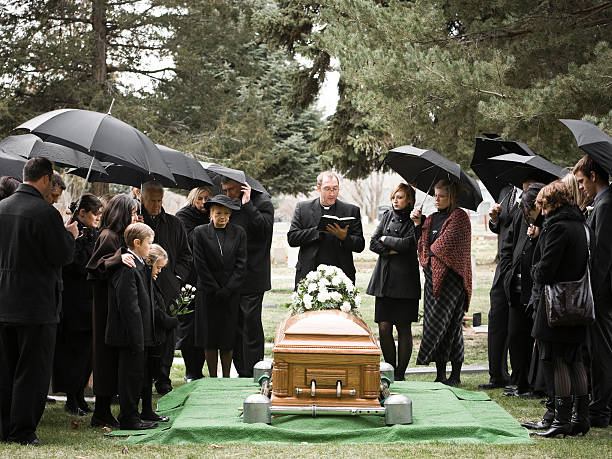Navigating the delicate terrain of funeral etiquette can be challenging, especially when faced with the grief and solemnity of the occasion. However, following funeral protocol is a wonderful way to show respect for the departed and their loved ones and offer consolation and assistance during a trying time. This guide will explore the intricacies of funeral etiquette, from appropriate attire to respectful behavior, helping you navigate these sensitive situations with grace and dignity.
Dressing Appropriately:
One of the most important aspects of funeral etiquette is dressing appropriately for the occasion. It is important that your clothing respects and represents the seriousness of the occasion, taking into account any cultural or religious traditions. Traditional funeral wear is acceptable for most occasions and includes gowns in subdued hues or black suits. Avoid flashy or casual clothing, as it may be seen as disrespectful or inappropriate for the somber atmosphere of a funeral.
When deciding what to wear to a funeral, it’s essential to consider the wishes of the deceased’s family and any specific instructions provided by the funeral home or religious officiant. Choose conservative clothing that shows your respect for the departed and their loved ones if you’re not sure about the dress code.
Arriving on Time:
Arriving on time is a crucial aspect of funeral etiquette that demonstrates your respect for the deceased and their family. Being on time enables you to express your sympathies and pay your respects without interfering with the funeral arrangements or diverting focus away from the bereaved family.
Plan to arrive at least 15-30 minutes before the funeral service’s scheduled start time to allow for parking, seating, and any last-minute preparations. Consider contacting the family in advance to let them know you will be unavoidably delayed and to offer your sympathies.Upon arrival, enter the funeral home or place of worship quietly and respectfully. Avoid loud conversations or disruptive behavior that may disturb others who are mourning.
Offering Condolences:
Offering condolences to the grieving family is an essential part of funeral etiquette, providing comfort and support during a difficult time. Sharing happy memories of the departed with the family and expressing your condolences will help them feel less alone in their loss.Approach the family members with compassion and honesty while expressing your condolences. Keep your message brief but heartfelt, offering words of comfort and support without dwelling on your own emotions or experiences. Avoid clichéd phrases or platitudes that may come across as insincere or trite.
Remember to listen closely to the family members’ comments and, if necessary, provide further help or support. In their hour of need, your presence and encouraging words may make a world of difference.
Respecting Religious and Cultural Customs:
Funerals often involve religious or cultural traditions that dictate specific customs and rituals. Respecting these customs shows that you are sensitive to and conscious of the family’s values.Before attending a funeral, spend some time familiarizing yourself with any applicable religious or cultural norms. These might include covering your head, taking off your shoes before entering a place of worship, or engaging in certain prayers or rituals.
Respect the customs and rituals of the funeral service and follow instructions from the officiant or religious leader. If you’re unsure how to act properly, observe how others behave and note your own actions.
Turning Off Your Phone:
One of the most common breaches of funeral etiquette is allowing your phone to disrupt the solemnity of the occasion. Noise, such as buzzing notifications, ringing phones, or distracting devices, may distract attention from the solemnity of the occasion and unnecessarily upset those who are grieving.
Before entering the funeral service, silence or turn off your phone completely. This little gesture not only guarantees that you won’t unintentionally disrupt the service with unwanted noise or distractions, but it also demonstrates respect for the departed and their loved ones.Keep your phone away during the funeral ceremony to avoid checking texts or going through social media. Instead, focus your attention on the solemnity of the occasion and offer your full support and presence to those who are mourning.
Conclusion:
Navigating the intricacies of funeral etiquette can be daunting. Still, by following these guidelines, you can show your respect and support for the deceased and their loved ones with grace and dignity. Your caring gestures, like dressing correctly, being on time, expressing sincere sympathies, and honoring religious traditions, will be appreciated and remembered by the bereaved. Remember, funerals are a time for reflection, remembrance, and honoring the deceased’s life, and your presence and support can make a meaningful difference during this difficult time.







